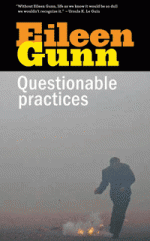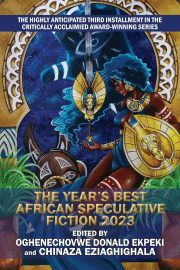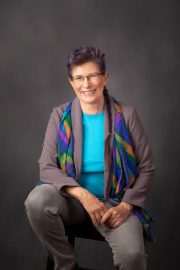Eileen Gunn on SF, SFWA, and Community
by Rachel Swirsky
 Eileen Gunn writes short stories. Her collection, Questionable Practices (March, 2014, Small Beer Press), contains most of her work from the past ten years, plus two previously unpublished stories, “Carry Water, Chop Wood,” and “Phantom Pain.” Her previous work includes the story collection Stable Strategies and Others (Tachyon, 2004) and The WisCon Chronicles Two (Aqueduct Press, 2008), a book of essays on politics and science fiction, which she co-edited with L. Timmel Duchamp. Her fiction has received the Nebula Award in the US the and Sense of Gender Award in Japan, and been nominated for the Hugo, Philip K. Dick, and World Fantasy awards and short-listed for the James Tiptree, Jr. award. Gunn was the editor/publisher of the influential Infinite Matrix webzine (2001-2008). She is a graduate of the Clarion Writers Workshop and served for 22 years on the board of directors of Clarion West. Her website is at http://www.eileengunn.com.
Eileen Gunn writes short stories. Her collection, Questionable Practices (March, 2014, Small Beer Press), contains most of her work from the past ten years, plus two previously unpublished stories, “Carry Water, Chop Wood,” and “Phantom Pain.” Her previous work includes the story collection Stable Strategies and Others (Tachyon, 2004) and The WisCon Chronicles Two (Aqueduct Press, 2008), a book of essays on politics and science fiction, which she co-edited with L. Timmel Duchamp. Her fiction has received the Nebula Award in the US the and Sense of Gender Award in Japan, and been nominated for the Hugo, Philip K. Dick, and World Fantasy awards and short-listed for the James Tiptree, Jr. award. Gunn was the editor/publisher of the influential Infinite Matrix webzine (2001-2008). She is a graduate of the Clarion Writers Workshop and served for 22 years on the board of directors of Clarion West. Her website is at http://www.eileengunn.com.
Rachel Swirsky: When did you join SFWA? Who was SFWA president then?
Eileen Gunn: I first tried to join SFWA in 1978, when my story “What Are Friends For?” was published in Amazing. In those days, you could join as a pro with just one story. But SFWA had banned Amazing as a qualifying market, because, if I recall correctly, the rates were poor and the publisher did not always pay as promised — although it clearly was a pro market, publishing stories from major writers and selling 26,000 copies per issue. At any rate, SFWA had called for a boycott of Amazing, but members were still selling them stories. I knew about the boycott, so I was under no illusion that I could join SFWA with that credential.
My story had come out just before the Worldcon, which was in Phoenix that year, IguanaCon II. When I got my badge at registration, Damon Knight was standing nearby, and he noticed that I’d been given an ordinary attendee badge. “You’re a pro now!” he declared, and he took me back to registration and told them to give me a pro badge, which was a different color or something. He told me I had to join SFWA, and introduced me right then and there to Jack Williamson, the president of SFWA, and insisted I come to the SFWA meeting. It was all very gratifying, like being promoted to full partner in a law firm, but I knew I didn’t deserve it.
“I don’t qualify,” I said to Damon, “because of the Amazing boycott.”
“Oh, that’s all over,” he said. “We’re going to vote to end it at the meeting.”
Well, they did end the boycott at the meeting, but, at the same time, they changed the pro qualifications to be three published stories, so I no longer qualified for membership. Although everyone at the meeting had said I’d have no problem being accepted, the membership director took a very different position.
After having been assured I was a pro in September, I didn’t want to revert to being an amateur in October, especially since the judgment was made purely on a technicality. So I waited until I’d written and published three stories.
So the answer is officially 1983, when Marta Randall was president of SFWA, the first woman to be so. I’d already been a professional writer for fifteen years, but not of science fiction.
What made up your mind to join?
Well, it was a rite of passage. I didn’t feel it certified me in any way as a writer, but being a member meant you could legitimately attend parties in the SFWA suite on your own recognizance, hobnobbing with the great and near-great. If you were a member, you didn’t have to loiter, waif-like, outside the door, until a higher-status friend came by to escort you in. In addition, of course, belonging to SFWA was a way of honoring Damon, who founded it, and of recognizing the organization and its very real accomplishments for professional SF writers. Plus – and this was definitely a dubious benefit – it meant you received a subscription to the SFWA Forum, which was both an important source of scuttlebutt about SF publishing and a wince-inducing iteration of personal feuds by people who wrote long. Not unlike the Internet, except it was printed on paper. It’s easy to forget how isolated writers were at the time, and that the Forum was a way of staying connected.
You said you’ve met Damon Knight. What was that like?
Damon was a wonderful writer, a stern editor, a tireless teacher, a bit of a prankster, and a witty and generous friend. He was a remarkably original thinker and a great conversationalist. He and Kate Wilhelm were among my teachers at Clarion in 1976, and they hosted a monthly workshop in Eugene that I was part of for many years. Damon was active in the legendary Genie online community in the 1990s, where he was both a force for good writing and a wiseass kid. He took writing and creativity very, very seriously, but with a certain glee. I’d been a huge fan of his short stories when I was a teenager, and I’m sure that Damon’s work is one of my formative influences from within SF. I miss him.
Do you have any great stories about meeting someone at a SFWA event, or online? (And if you do, please tell them. 😉 )
Most of my stories about SFWA events are far too scurrilous to put into print. SFWAns were not very well behaved in the Eighties and Nineties. Sit next to me at a Nebula banquet, and I might tell you some….
You’ve won the Nebula. What was that like? Were you able to be there in person?
The best time to enjoy being a Nebula nominee is at the banquet before you lose, so I definitely attended. I wasn’t expecting to win, and it was surprisingly surprising. The weird thing about winning is that you begin to think that you deserved to win. The audience claps and applauds, people congratulate you, and you forget that what it means is that slightly more people voted for you than for five other people. The Nebula is a very pretty award: I loved carrying it around that night and taking its picture. I like having won, I like seeing it on my bookshelf, and I would like more Nebulas to go with it. But I try to keep it in perspective: it means that people liked my story, but it doesn’t mean that I deserved it more than anyone else.
Did SFWA help in your early career?
It’s a little hard to separate out what did what. Clarion was essential, and led to my becoming a part of a community of writers with whom I shared goals and aesthetic concerns. Of course, all my teachers at Clarion were or had been SFWA members. Going to SF conventions enlarged that community, and SFWA was definitely part of that, whether or not I had to sneak into the parties. Being a member of SFWA in the 1980s was definitely helpful, but I think SFWA is much more activist and useful now to newer writers. That aspect of SFWA really got underway with the ascendance of the Web in the 1990s and after. I think SFWA is now an enormously useful organization for the new writer, for people putting together their careers. In the 1970s and the 1980s, it was of more use to established writers, I think. There was a strict hierarchy then — and I’m not someone who is comforted by hierarchy. On the other hand, I am energized by feeling I’m out on the fringes, and SFWA had plenty of fringes to be out on.
What’s your best experience with SFWA?
I’d have to say that there’s no one best experience. I’ve been to many memorable Nebula banquets and weekends, had many delightful dinners with remarkable people. The best experience has been the discourse, some of it friendly, some of it contentious, over the entire stretch of the thirty years I’ve been a member. My choice for most useful SFWA service for both new and established writers is Writer Beware. Victoria Strauss and Ann Crispin are my heroes.
The worst?
Again, there’s no one particular experience, but the legendary contentiousness of SFWAns, which I think has diminished over the past decade, has been the least pleasant part, and still is, in isolated spots. I know that there has been a determined effort over the past seven years or so to change the mood of the discourse, and I support that. It has borne fruit.
The most memorable?
I do have a story of the kind of community that SFWA could provide despite its contentiousness. In 1991, Avram Davidson, who lived outside of Seattle, mentioned to me that his typewriter needed to be replaced and, because he could no longer see very well, he wanted exactly the same model, which was no longer made. There was no eBay then, so I asked on the SFWA topics on GEnie, and a number of people rummaged through their attics, and offered me working typewriters that they’d replaced with computers. Harry Turtledove had the same typewriter as Avram and sent it at his own expense. Avram was clearly gratified. “Harry and I had sort of a falling out,” he said. “Didn’t think we were still speaking to one another. I’ll write to him.”
How has SFWA changed since you joined?
I think I’ve covered that in several places above. In general, it’s a more welcoming organization, and has more tools for new writers. It has also gotten better at advocacy for writers: quietly settling disputes with publishers, rather than organizing public boycotts.
How has the way that you interact with SFWA changed as your career developed?
Well, getting into the SFWA suite is no longer a hurdle at every convention…. Seriously? The big change over thirty years has been driven by the Internet, not by my career. It is much easier to connect with other people who form part of what I consider community. The conversation topics on the SFWA website are a great service to members, and they build on the work of the sysops of the GEnie boards and its successors Dueling Modems and SFF.net, especially Jim McDonald (a.k.a. Yog Sysop) and Jeffry Dwight, who can never be thanked enough, in my opinion.
What could SFWA-now learn from SFWA-then?
I think SFWA as an organization has already learned that the loudest voice in the room is not necessarily the one that should dominate the discourse. It’s too bad that learning, like time, flows only in one direction.
Do you feel like SFWAs role in the SF community as whole has changed? Does it have more weight? Less? Was it a driver for how to meet people then? Is it now?
Outside of SFWA, the way people connect to one another has changed, and so has the acknowledged SF community. The broader SF community of readers and writers now acknowledges people who were always there, but were ignored: women and people of color. SFWA had to choose whether to be part of the 21st century or to be irrelevant. For a while there, at the turn of the century, it looked as though SFWA was going to be irrelevant: the old ways died hard.
In addition, the way people connect has changed, and SFWA’s advantages as a community are no longer as valuable as they once were: there are lots of SF communities, and SFWA is just one among many. I think this is a good thing, and fortunately SFWA has avoided becoming a community composed entirely of angry old white men, which seemed a danger for a while.
What would you like to see for SFWA in the future?
I think that’s a question best answered by people at the beginning or middle of their careers. Those are the people SFWA needs to attract and keep.
You’ve taken on mentor-like roles, such as your work with Clarion West. Do you have any stories you’d like to share about those relationships? Thinking about your early days in SFWA, when you were just starting out, do you have any thoughts about what it’s like to be someone people look to as a mentor now?
I’ve never been a huge fan of the “mentoring” concept, as it describes itself – it seems patronizing and self-aggrandizing. We’re all adults here: let’s treat one another as equals. However, I’ve benefitted enormously over my writing life, including in my advertising/marketing career, from people who have shared their knowledge with me when I needed it. In offering advice, there’s a fine line between being descriptive and being prescriptive, and a not-so-fine line between advising from one’s experience, and simply nattering on. I try to return the favors I’ve received without crossing those lines.
My father was a successful graphic designer in Boston, and he always made time to see students and new graduates of design schools. He’d meet with them, review their work, tell them who was hiring, and generally encourage them. I worked for my father for eight years, during high school and college, and scheduled those appointments for him, usually during his lunch hour. He set me a very good example, as did Kate and Damon, Joe and Gay Haldeman, and editors such as David Hartwell, Gardner Dozois, and Sheila Williams.
There are certain kinds of writers I’m particularly concerned about: writers who write slowly, or who deal with difficult subjects or subjects outside the mainstream – writers who deliberately choose, for whatever reasons, to write outside the marketplace trends. These writers are the potential heirs to Octavia E. Butler, Ted Chiang, Howard Waldrop, and, strange as it may seem, William Gibson and George R. R. Martin. I think SFWA and the Clarion and Clarion West workshops, indeed speculative literature in general, have historically supported those kinds of writers by providing community, feedback, and role models. SFWA has honored those writers with Nebula awards and nominations. I hope that, as it widens its reach and relevance, SFWA will continue to attract and support the wildly original writers, the writers with limited patience for advance marketing, and the brilliant but stubbornly self-effacing writers. They give energy to the entire field, and we need to save them some seats at the awards banquet.
Are there any anecdotes you’d like to tell about your writing career, SFWA-related or not?
I think I’ve gone on quite long enough.<g>


